Medical cannabis in Alabama is coming closer. And some out-of-state firms want in.
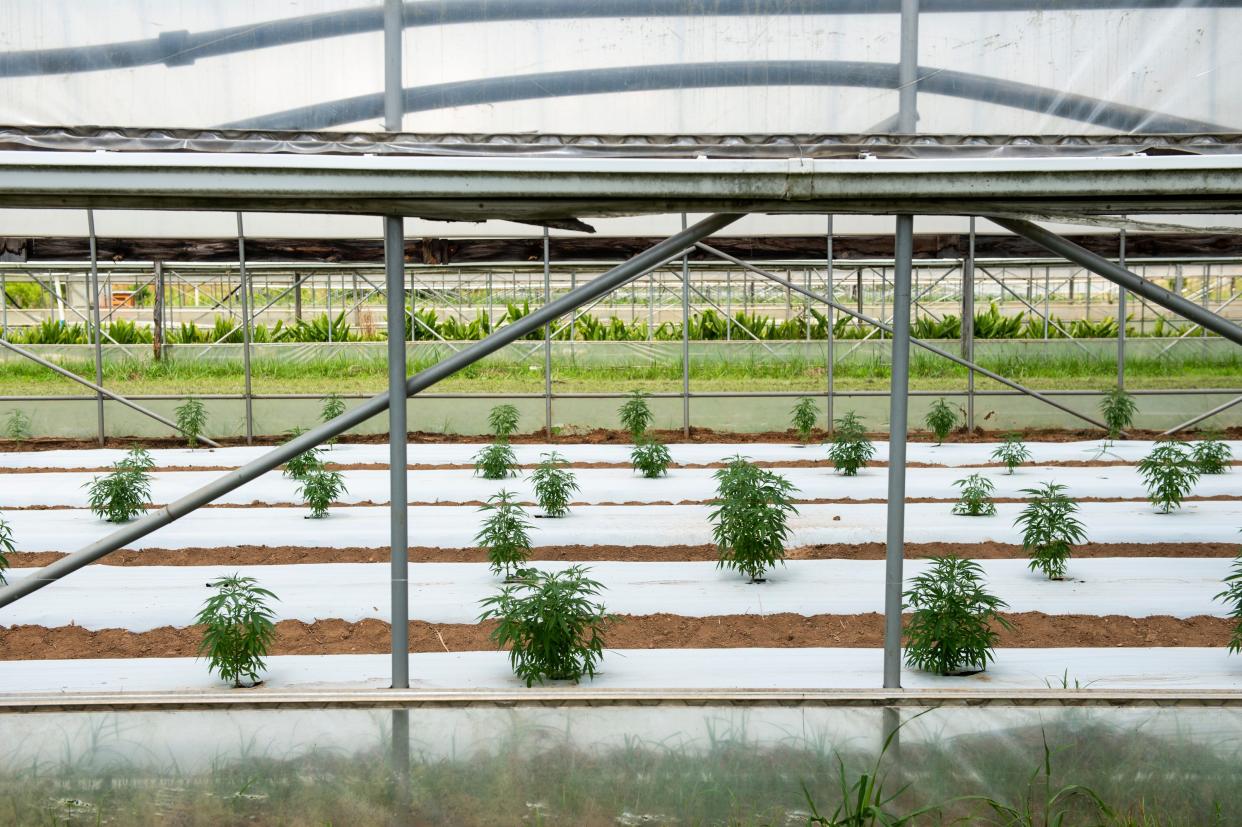
All the promise and peril of medical cannabis in Alabama lies in a pound of a strain known as granddaddy purple.
Tracy Reed, a Montgomery apartment building manager, gets about that much each month. He puts it in a boiler for two to three hours and makes it into a tea, which he then chills in a refrigerator. He drinks a cup of tea in the morning and a cup in the evening. It helps Reed manage chronic back pain, which developed from loading and unloading overhead bins as a California-based flight attendant for Southwest Airlines.
“It’s like a smooth kick-in, and it lasts long,” Reed said in a recent interview. “I took a cup this morning. I’m able to get up, talk, move. But if I miss one day of taking my tea, I’m in trouble. Because my back’s killing me.”
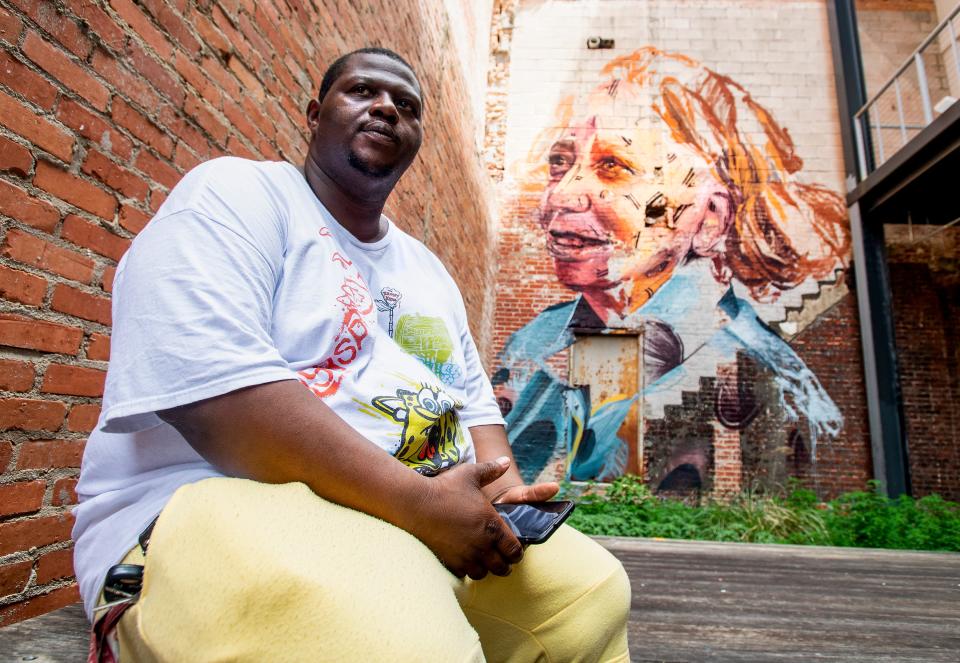
Reed has been drinking the tea since about 2009, when a doctor in California recommended cannabis to him. Pharmaceuticals gave him no relief. Ibuprofen gives him rashes. Before cannabis, doctors prescribed him opioids. Hydrocodone hurt his joints. One physician prescribed him methadone, which he promptly returned after a dose made him “scared and shaky.”
The tea lets him function. But it’s a challenge to get it. A pound of grandaddy purple costs $400, all out of Reed’s pockets. Alabama does not recognize or protect medical cannabis patients from other states. In early June, police arrested Reed and charged him with 1st-degree marijuana possession after finding his marijuana during a traffic stop. A court date has not been set.
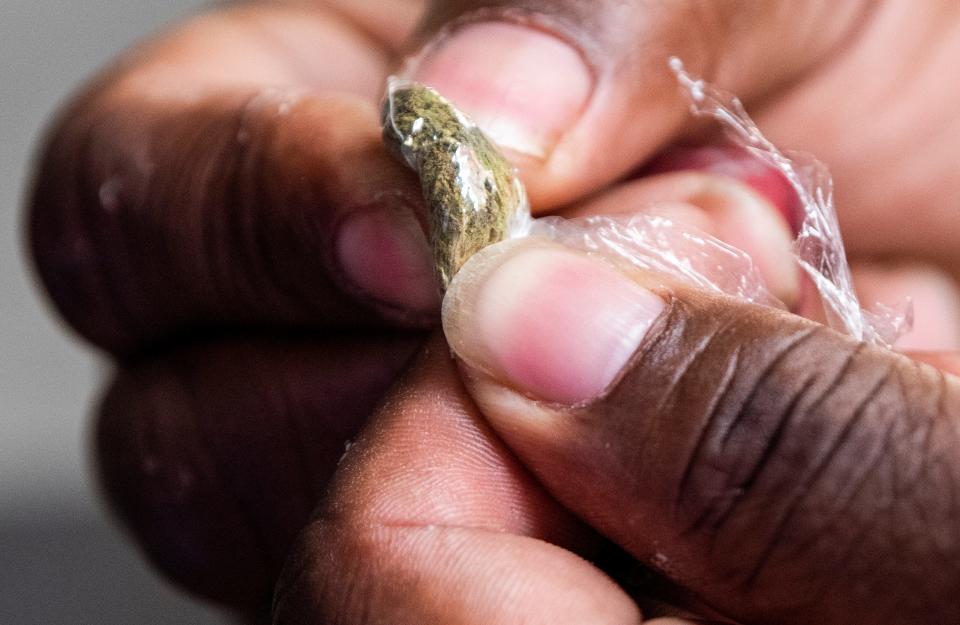
“If you’ve got a condition in Alabama, it feels weird, because there’s nothing that you can do for your condition,” he said. “You don’t want to go illegal. So I have to go out of town to California and stuff like that. And I can’t really afford to keep traveling all the time. Because it can take me away from the benefit of raising my kids.”
A difficult beginning
Alabama is at a midway point between old prohibitions and mild liberalization of marijuana laws. Gov. Kay Ivey last year signed a law to create a medical cannabis program for Alabamians. The Alabama Medical Cannabis Commission (AMCC), which will oversee the program, is expected to approve rules for use, licensing and distribution at its Aug. 11 meeting.
From 2021: Alabama medical marijuana bill headed to Gov. Kay Ivey after historic House vote
But legal medical cannabis in the state is more than a year away. License applications for growing, processing and distributing medical cannabis will probably not be available by Sept. 1, the date set in the 2021 law to begin licensing. The AMCC will not issue licenses until next June. As a result, patients will not have the product until the end of 2023, at the earliest.
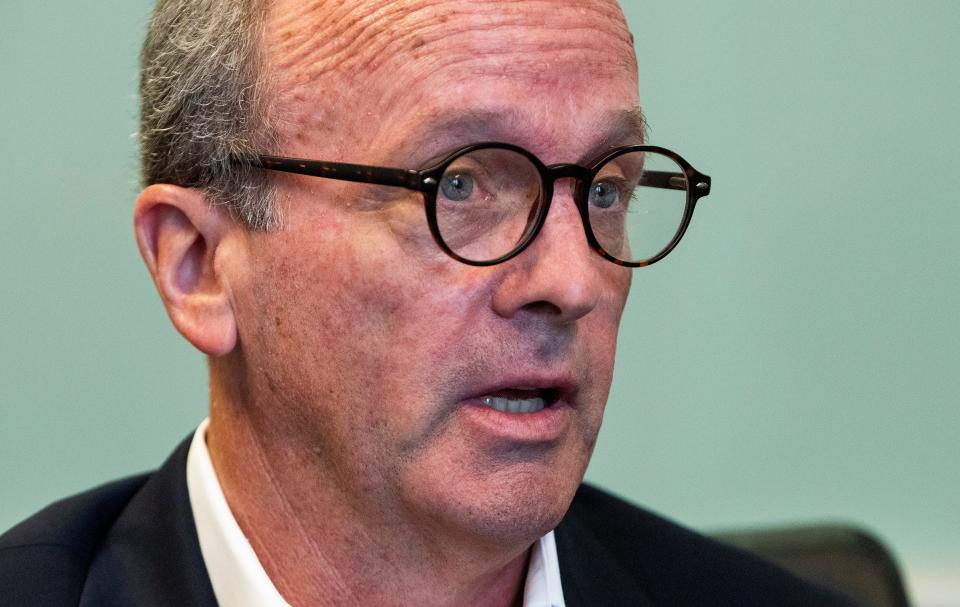
“We’ve had thousands of contacts on our webpage from patients, from parents of patients who believe these patients would qualify and would benefit from medical cannabis,” said Daniel Autrey, assistant director of the AMCC, in a recent interview. “But there’s been a process, and our statute lays out that process requiring us to manage and put a structure in the program.”
The law’s stated goal of creating an exclusively Alabama industry may also face challenges. Under the 2021 law, a company applying for a cannabis license must be majority-owned by persons or entities that have resided in Alabama for 15 years. The law also reserves a certain number of licenses for majority-minority businesses.
But the law does not prohibit out-of-state companies from buying minority shares in state cannabis firms. An analysis of public records by the Montgomery Advertiser found at least two out-of-state cannabis companies have set up business entities in Alabama in the past two years and hired lobbyists in Montgomery.
Another Alabama group that has a related company in Georgia has announced a partnership with two state businesses to develop medical cannabis.
The AMCC says it is committed to giving Alabama businesses priority, and local advocates and businesses said the process to this point has been fair. But with a limited amount of licenses, huge capital costs, and a potentially expensive application process, there is edginess about larger conglomerates getting involved.
“Down the line, we are all working very hard to prevent any type of — I don’t want to say corruption, but that’s the only word to use,” said Chey Garrigan, the director of the Alabama Cannabis Industry Association. “That everything is going to be considered in a very fair process.”
And there is always the possibility those denied licenses could go to court. One firm has already suggested that residency requirements in the medical cannabis law are unconstitutional. The potential for litigation was a key reason the Department of Agriculture and Industries asked to be excluded from awarding cultivator licenses, which go to farmers.
“With finite licenses, there will probably be some lawsuits about why some people got licenses and others didn’t,” said Rick Pate, the commissioner of the Department of Agriculture and Industries. “I didn’t want us tied up in all that.”
Opportunities and restrictions
Few would doubt the potential for a medical cannabis market in the state. Alabama’s population is aging, and racism and poverty have fueled poor health outcomes throughout the state. According to the Centers for Disease Control and Prevention, Alabama in 2020 had the nation’s eighth-highest deaths per capita from cancer, and the third-highest rate of death from heart disease. Alabama for years had a high rate of opioid prescriptions: In 2016, there was more than one for every man, woman and child in the state.
Men and women who use marijuana to manage pain and illness, or have loved ones who do, spent hours testifying for legal access to cannabis at public hearings over the past few years. During debates over the legislation in 2021, many legislators told emotional stories about the suffering endured by family members struggling with illness. Cynthia Atkinson, the widow of former WSFA meteorologist Dan Atkinson, has said medical cannabis gave her husband relief from Crohn’s Disease and has encouraged the development of a state program.
“I believe this is going to be a game changer for so many people,” Atkinson said at a July 14 meeting of the AMCC. “To allow them the opportunity to do something that’s more natural-based, versus synthetic chemicals that are addictive and can destroy people’s lives in many ways, this is just a phenomenal option.”
The 2021 law allows the use of medical cannabis for 16 different conditions, including cancer, depression, Parkinson’s Disease, PTSD, sickle-cell anemia, chronic pain and terminal illness. Doctors will have to certify patients to use medical cannabis; those patients will have to apply for a card and get registered in a database before they can get medical cannabis at dispensaries.
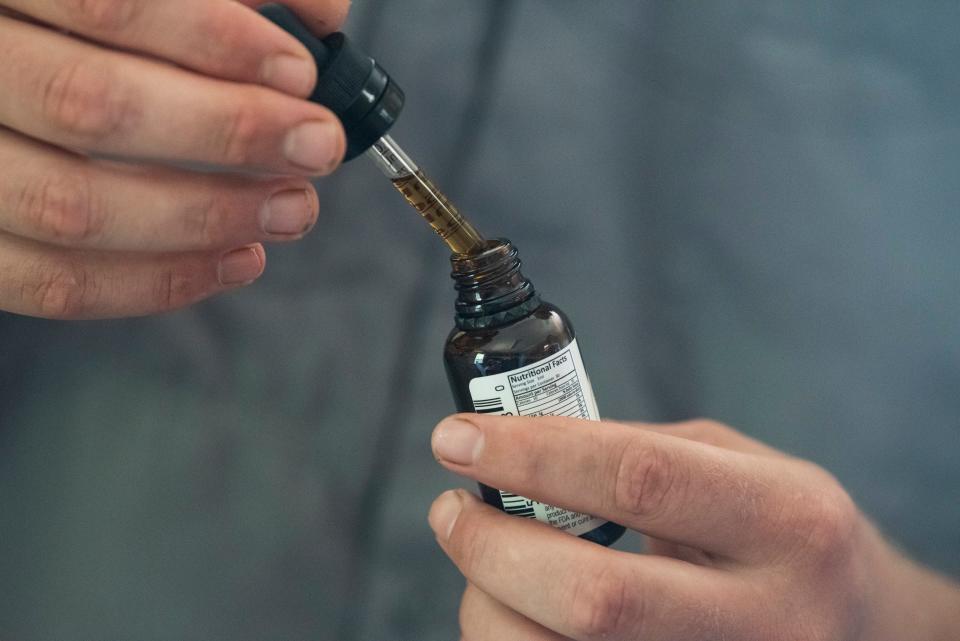
But overcoming opposition to the bill led to strict requirements. Most people qualifying for medical marijuana will be able to take only 50 mg of medical cannabis per day. A doctor can increase the dosage to 75 mg after three months, but cannot go higher. (There will be no caps for terminally ill patients.)
Cannabis will be available as tablets, capsules, gelatins, oils, gels, creams, suppositories, transdermal patches, or inhalable oils or liquids. The law bans smoking marijuana or consuming it in food. (The gummies can only have one flavor: the AMCC says it will be peach.) Farmers will have to grow medical cannabis in tightly controlled facilities.
“I have been around a pretty good while and I’m not sure I’ve ever seen a law that’s so specific,” said John McMillan, the director of the Alabama Medical Cannabis Commission.
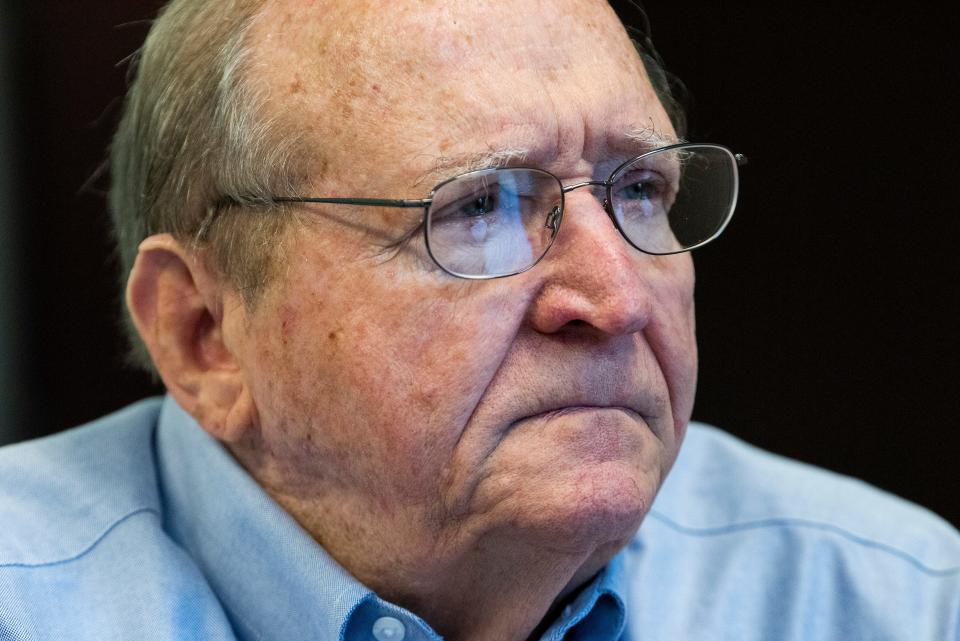
Such restrictions make some uneasy. Before he started using cannabis in tea, Reed had to experiment with different approaches to find what worked for him. Edibles gave him panic attacks. Smoking marijuana calmed him down and helped with his depression and ADHD, and he still uses it for that. But it also slowed him down in a way he didn’t like.
Limiting the types of cannabis consumption, Reed said, means patients who might not find the right kind of relief with the state's approved cannabis products would not have the same opportunities he did to find what works.
“They’re going to cause more problems there than they’re asking for,” he said. “Even though this is a help, it can also be a hurt if you don’t understand the usage of it.”
Melissa Mullins, the director of Alabamians for Medical Cannabis Freedom, said the dosage caps limits doctors’ abilities to change medication to suit the patient.
“There’s nobody on that commission that’s 100% for the patient,” she said. “It’s almost like taxation without representation.”
Creating an industry
The AMCC operates out of a suite in the RSA Judicial Building on Dexter Avenue. Like the agency and the industry it is helping create, the office seems inchoate: at a recent visit, there were no AMCC signs in the suite and many dark offices. As of late July, the commission had just five employees.
McMillan, who has served as director for a little over 10 months, said that until recently, “our whole lives have been around databases and rules and regulations.” In developing the guidelines for the state's cannabis industry, the commission studied the 2021 law, as well as what other states did and didn’t do with their medical cannabis programs.
“Some states actually began their programs without rules and regulations,” Autrey said. “We were not allowed to do that in Alabama.”
The AMCC will offer up to 12 cultivator licenses for growing medical marijuana; up to four licenses for processing it, and up to four for distribution. Another five licenses will go to “integrated facilities,” combining all three services with transportation. There are no limits on licenses for transportation or testing. Counties and cities must authorize medical cannabis businesses through ordinance or resolution. Montgomery passed an ordinance in December allowing medical cannabis dispensaries in the city.
But the licensing process is months away. The law stated that license applications could be accepted starting Sept. 1, but McMillan said in a July that license applications will not be ready by that date. Instead, the AMCC will invite businesses to express an interest in applying on that date. The license applications will go out to interested parties on Oct. 24, with a due date of Dec. 30. Licenses will not be awarded until June of next year. The farming of cannabis is unlikely to start before next July.
Autrey said in a July interview that the AMCC was developing the applications.
“I think an applicant can look at our draft rules, and they can get a really good idea of the kind of things our application is going to require,” Autrey said.
Physicians interested in participating in the program will have to take a class on medical cannabis. Mark Jackson, the executive director of the Medical Association of the State of Alabama (MASA), said in a recent interview that those classes probably would not be offered until the spring, while they wait for the rules to be finalized.
“Until that is done, we didn’t feel like it was right to be certifying physicians until we know what the parameters will be,” he said.
Expensive entry
At Neal Pope’s Farm in Salem, about eight miles east of Opelika in Lee County, rows of hemp that look like little Christmas trees stand a little under two feet high, rising from soil covered by white plastic sheets in greenhouses open at both ends. Benjamin Bramlett, who runs Sustainable CBD, based at the farm, says the hemp will eventually flower and grow up to seven feet high.
Alabama soil is generally more acidic than considered optimal for hemp, and the plant needs about as much nitrogen as farm crops.
“You can really, to some extent, compare it to tomatoes,” Bramlett said. “Tomatoes are a very difficult crop to grow. They take a lot of care and attention, and hemp is very similar, especially CBD hemp.”
When harvest time comes, Bramlett and employees will cut down the plants at the base, then strip the hemp and process it, getting it ready for testing. The company turns the crop into CBD products, which helps Sustainable CBD maintain profitability in a volatile industry: Hemp suffered a major price crash in 2019 after Congress authorized its production in the 2018 Farm Bill.
Bramlett plans to apply for an integrated license when they become available. But it won’t be cheap. Bramlett expects his medical cannabis facility will be about a half-acre in size; on a football field, that would be from the back of the end zone to about the 40-yard line. It will be enclosed, with concrete floors. The cannabis will have to be grown in pots, not in the ground. Powerful lights and individualized irrigation will create the conditions to grow the plant. And they’ll need keypads, video monitoring, and — according to the draft rules — two security guards on site 24/7.
An integrated facility could cost as much as $20 million, though Bramlett says with the equipment and existing structures, he could do it for between $7 million and $10 million. Getting permission will also be expensive. Bramlett thinks the application will require him to hire architects and attorneys, which could cost $500,000 to $1 million.
The security guard provision has also drawn concerns. At the July 14 meeting, one speaker said to maintain those security guards could cost $300,000 a year. Bramlett said even banks don’t employ guards 24/7.
“The doors aren’t open,” he said. “That’s the security, right? It’s not allowing entry.”
McMillan blamed the security requirements on the unsettled legality of marijuana at the federal level. Marijuana is still classified as a Schedule I drug — listed with the much-deadlier heroin — but since 2014, Congress has annually passed budget amendments preventing the U.S. Department of Justice from prosecuting state medical cannabis programs. But with prohibition still on the books, banks are reluctant to get involved in marijuana enterprises, and interstate issues remain a problem.
“That’s why a lot of those tight security things are in place, to protect the growers in the process, more than anyone else,” McMillan said. “Because they are the people who are subject to huge penalties for trying to operate in the business.”

Outside, looking in
The law anticipated making Alabama’s cannabis industry internal, and giving priority to Alabamians. The 15-year residency requirements for majority owners will at least guarantee participation by state businesses.
“I think throughout the legislation in the statute is Alabamians are an important part of this program,” Autrey said. “And we’re going to look at it that way.”
But out-of-state companies look interested. Trulieve, a Florida-based cannabis company, incorporated an Alabama branch in 2020, according to records with the Secretary of State’s office; Chicago-based Verano did so in June. Both have hired lobbyists in Montgomery.
Trulieve did not respond to emailed questions. Verano said in a statement that it planned to apply for a license and that it looked forward “to providing options to these patients by introducing our proprietary medical cannabis products,” but it did not answer questions regarding local partnerships. Brittany Peters, a spokeswoman for the AMCC, wrote in an email that medical cannabis in Alabama “must be cultivated, processed, and dispensed within Alabama’s borders.”
A group called Aspire Medical Partners has announced plans to apply for an integrated license through a partnership with Bridgeforth Family Farms and Claborn Manufacturing, both based in Limestone County. According to records with the Alabama Secretary of State, Aspire created an Alabama branch last December. It incorporated a Georgia branch in 2020, and has pursued medical cannabis licenses in the Peach State.
Aspire directed emailed questions to Kyle Bridgeforth, the owner of Bridgeforth Family Farms. In an email, Bridgeforth wrote that he was the majority owner of the Alabama firm.
"My family’s farm has been operating in Alabama for well over 100 years, and over the past few generations we have been very committed to working with partners like Hudson Alpha and Alabama A&M to innovate in the world of cultivation and agriculture," Bridgeforth wrote. "Aspire has been created to serve Alabama patients by providing reliable, consistent, medical grade cannabis, and to use our profits to develop R&D that can help improve the efficacy of cannabis-based therapeutics and develop innovations throughout the medical cannabis supply chain and beyond."
A white paper published on Aspire's website suggested that the law’s in-state restrictions could run afoul of the Dormant Commerce Clause, a legal doctrine that prohibits states from burdensome restrictions on interstate commerce.
“Many state statutes pertaining to state-level legalization of cannabis have contained provisions that strongly favor in-state residents over nonresidents in the licensing process,” the paper says. “These in-state residency requirements have been the subject of multiple court challenges under the Dormant Commerce Clause.”
Bridgeforth wrote that the company published the paper "because we believe that Alabama has an opportunity to learn from the challenges experienced by other states as it seeks to build a medical cannabis program that can meet the needs of Alabama patients and help grow the state’s economy."
In a document included with a filing last August, Aspire's Georgia branch listed David Dlugolenski, an Atlanta-based developer, as a manager. Bridgeforth wrote that Dlugolenski was a partner but said the company was "born and bred here in north Alabama."
"Alabama is where our core genetics and agriculture R&D partners (HudsonAlpha and Alabama A&M) are located -- and this is where we intend for any subsequent ventures born from those R&D initiatives will be based," he wrote.
Peters wrote that applicants for medical cannabis licenses will have to disclose ownership arrangements on their applications. The fear from state businesses and advocates is that those companies could drown out other competition while following the letter of the law.
“They’ll come in the same way in a minority partnership, with other contractual agreements that helped them to probably get more of the return from it without having that much of an equity share in the company,” Bramlett said. “I think there’s no question that’s going to happen, and that is a concern of ours.”
The law also requires at least a quarter of the licenses and at least a fifth of the integrated producer licenses to go to a majority-minority owned business. Antoine Mordican, an engineer who runs Native Black Farm in Bessemer, asked the commission on July 14 to ensure state residents had a chance to participate in the system.
“The goal is to ensure Alabamians can participate, and to pay a little more attention to the underserved community, to make sure we are able to get things as well,” he said.
Whoever grows it, the product will not be cheap. Alabamians enrolled in the system will have to pay up to $65 to apply for a medical cannabis card. The price of medical cannabis isn’t certain yet, but with insurers not paying for it, most of the cost will come out of pocket.
“There is a huge need, a larger need for this alternative to pharmaceuticals,” Garrigan said. “The market’s there. But until we get boots on the ground and start running, we’re not going to know.”
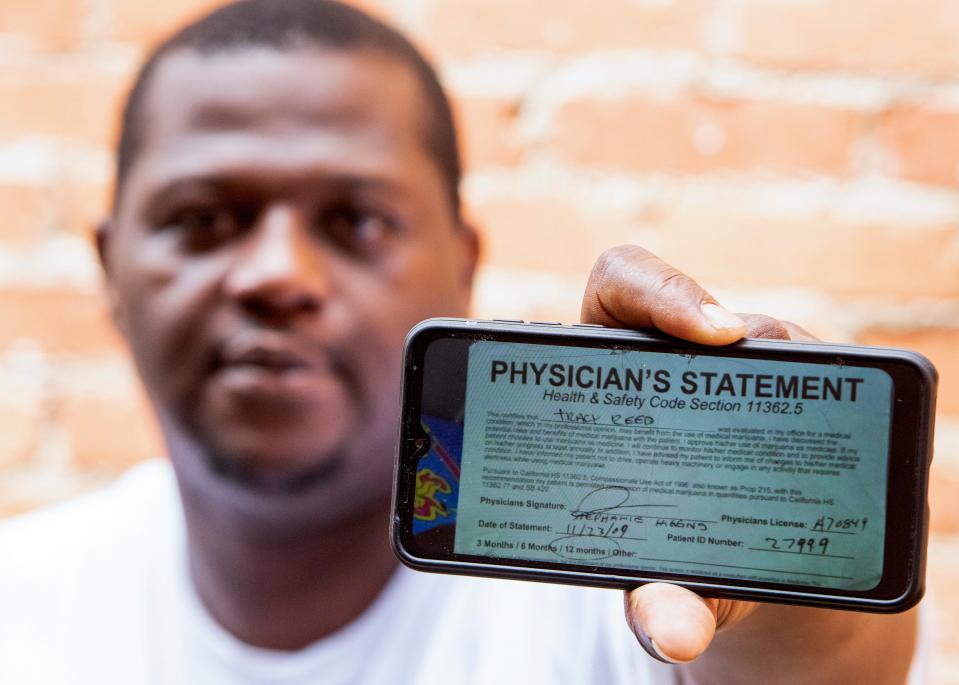
Reed, though, is not willing to wait that long. He was having a difficult year before his arrest in June; his nephew Jeffrey was killed in a mass shooting at Bama Lanes on Jan. 9, and he said the marijuana helps him cope with that. He said he was considering going back to California, in part over his frustrations with Alabama’s approach to medical cannabis.
“This can help a lot of people overcome certain stuff,” he said. “It’s not that your pain is going to go away, or anything like that. But a temporary relief is better than no relief.”
Contact Montgomery Advertiser reporter Brian Lyman at 334-240-0185 or blyman@gannett.com.
This article originally appeared on Montgomery Advertiser: Medical cannabis in Alabama is coming closer. And some out-of-state firms want in.

